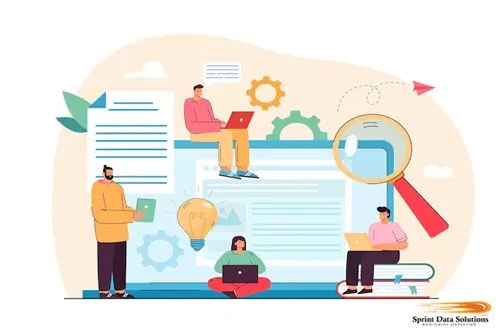The Best Way To Do Business With Other Businesses Is To Know Them
The Business-to-Business (B2B) sector is a highly lucrative and competitive market, distinct from the general consumer landscape in both structure and dynamics. While consumer markets are often driven by trends, emotional appeal, and impulse purchasing, B2B transactions focus primarily on delivering measurable value, addressing specific business needs, and fostering long-term relationships. Success in the B2B world depends on the ability to build trust, maintain a strong reputation, and offer high-quality products or services that can enhance a company’s operations or bottom line.
Unlike consumer sales, where emotional triggers and brand loyalty may play significant roles, B2B transactions are typically rational and deliberate. Businesses purchase goods and services with the aim of solving problems, improving efficiency, reducing costs, or gaining a competitive edge. This makes B2B sales cycles longer and more complex, as decisions are not made on a whim. Instead, purchases are part of a larger strategy, often driven by a variety of factors, such as operational needs, market conditions, and long-term goals. The complexity of these transactions requires businesses to thoroughly vet their suppliers and service providers, ensuring that any investment made aligns with their strategic objectives.
Reaching businesses with the right products or services necessitates a more focused and targeted approach compared to consumer marketing. The decision-making process within businesses involves multiple stakeholders, each with their own set of priorities and considerations. Key personnel, such as procurement managers, department heads, and executives, are responsible for authorizing expenditures, and their decisions are based on data, cost-benefit analyses, and alignment with organizational goals. This makes the B2B sales process more intricate, requiring a deep understanding of the client’s industry, specific challenges, and the unique needs of each business.
To succeed in B2B marketing, it’s essential to approach potential clients with a tailored strategy that speaks to their needs and addresses their pain points. Relationships are paramount in this space, as businesses are more likely to engage with partners who demonstrate expertise, reliability, and a genuine understanding of their objectives. Building credibility and trust through well-researched, targeted marketing efforts is key to establishing long-term partnerships in the B2B market. By providing value and aligning with the client’s business goals, B2B companies can navigate the competitive landscape and achieve sustainable success.

Finding The Right Staff Member
In the B2B sector, one of the most significant hurdles businesses face is identifying the right decision-maker within an organization. This challenge stems from the fact that only a select few individuals in a company possess the authority to approve the purchase of new products or services. The exact person to contact often depends on factors such as the size and structure of the organization, as well as the nature of the offering. For instance, in the case of financial services, the decision-maker is typically a senior finance manager or CFO. Conversely, for purchasing office supplies or equipment, a procurement manager or operations director may hold the purchasing power.
This issue is further complicated by the lack of transparency in many organizational hierarchies. In some cases, it may not be immediately obvious who holds the decision-making authority for a particular product or service. This lack of clarity can make outreach efforts time-consuming and frustrating, requiring extensive research to identify the correct individual. In some instances, businesses may mistakenly target the wrong person—either due to assumptions about their role or outdated information—leading to wasted efforts, lost opportunities, and potential harm to relationships. An ill-targeted marketing pitch not only reduces the chance of success but can also result in a negative perception of the company, making it harder to gain access to decision-makers in the future.
Moreover, the fast-paced nature of the modern business world means that decision-makers change roles frequently, and companies often undergo restructuring. This makes maintaining accurate and up-to-date contact information crucial, yet even more difficult. Without a reliable and comprehensive database, reaching the right contact can become a guessing game, with significant time and resources wasted in the process. The ability to accurately pinpoint the right decision-maker is essential for ensuring that marketing efforts are effective, relationships are built on the right foundations, and sales teams are positioned for success.
To overcome these challenges, companies must invest in advanced targeting solutions that offer real-time, accurate, and comprehensive contact information. This enables businesses to approach the correct person in the organization from the start, avoiding costly missteps and ensuring that their outreach is both relevant and impactful. With the right data tools and strategies in place, B2B companies can streamline their sales process, increase their chances of success, and build stronger, more lasting relationships with their clients.
Success in the B2B sector requires a tailored approach that combines proven strategies from general consumer marketing with techniques specifically designed for organizational outreach. To excel in B2B marketing, businesses must focus on key strategies, including:
Research
In B2B marketing, success hinges on one fundamental principle: data-driven decision-making. While the adage “knowledge is power” is universally true, in the B2B world, it translates directly into tangible profit and sustainable growth. The ability to gather, analyze, and leverage comprehensive data is what separates thriving businesses from those that struggle to stay competitive. To truly excel in B2B marketing, you need more than just basic information—you need deep insights into your industry, a thorough understanding of your potential clients’ needs and behaviors, and an awareness of broader market trends that may impact your strategy.
Effective B2B marketing goes beyond traditional methods of outreach. It requires a proactive approach to collecting data that can guide your decision-making process. This means identifying key industry pain points, tracking shifts in customer preferences, and gaining visibility into the behaviors and motivations of decision-makers at every level. By understanding the broader context of the market and the specific challenges businesses face, you can craft highly relevant, targeted marketing strategies that speak directly to your audience’s needs. Whether through personalized email campaigns, content marketing, or targeted outreach, the more informed you are about your prospects, the more effectively you can engage with them.
In addition to understanding your client base, staying ahead of market trends and the evolving needs of related sectors is equally important. By keeping a finger on the pulse of industry shifts and economic factors that affect your target audience, you position your business to not only respond to changes but anticipate them, giving you a competitive edge. The more informed and agile you are, the better equipped you’ll be to develop strategies that resonate with decision-makers, increase engagement, and ultimately drive long-term business success.
In short, data is not just a tool—it’s the foundation of every successful B2B marketing strategy. By investing in robust data collection methods, market analysis, and continuous learning, you can build a marketing approach that maximizes your return on investment and fosters meaningful, profitable relationships with other businesses.

Testing & Optimization
Once your research phase is complete, the next essential step is to implement your findings and evaluate the effectiveness of your strategies in real-world conditions. There’s often a significant gap between theoretical insights and practical execution, which is why testing becomes a critical component in refining your marketing approach. While it’s possible that your strategies will yield the desired results right from the start, it’s equally important to acknowledge that testing may reveal unexpected variables or challenges that could affect the success of your initiatives.
This phase of testing provides invaluable feedback that serves as the foundation for further refinement. By analyzing the results of your campaigns, you can identify areas that require adjustment, whether it’s a shift in messaging, targeting, or delivery methods. These insights allow you to make informed decisions that strengthen the effectiveness of your marketing tactics and ensure that your approach is adaptable to changing circumstances.
Ultimately, the process of testing and adapting allows you to transform well-researched theories into reliable, proven marketing practices. Through continuous optimization, you not only improve your current campaigns but also build a framework for long-term success. This iterative approach ensures that your strategies evolve with both market trends and customer preferences, driving consistent results and delivering a strong return on investment. The key is staying flexible, open to feedback, and committed to using data-driven insights to guide your decision-making, which is how successful marketing campaigns are built and sustained over time.
Specialization
In contrast to general consumer marketing, which typically employs broad strategies to reach a vast audience, success in the B2B sector is often driven by specialization and precision. Businesses in this space are not just looking for generic products or services; they seek solutions that address their unique needs, challenges, and goals. Whether it’s a specialized software tool, a tailored consulting service, or a unique supply chain solution, B2B marketing thrives when companies can demonstrate deep knowledge and expertise in a particular niche. Specialization allows businesses to offer value that mass-market solutions simply cannot, creating a strong competitive advantage.
Mastering a niche within the B2B sector requires a deep understanding of the specific pain points, needs, and objectives of your target market. By honing in on these specialized areas, businesses can craft messaging and offerings that speak directly to the issues at hand, ensuring that their products or services stand out as highly relevant and essential. This focused approach not only drives greater customer satisfaction but also fosters trust and loyalty, as businesses within the niche begin to see the specialized provider as a thought leader and expert in their field.
Interestingly, excelling in a particular niche can have a paradoxical effect—by serving a highly specialized market, businesses often find themselves attracting a broader array of organizations with similar needs, even if those clients fall outside the immediate niche. As a reputation for expertise and reliability grows within the niche, word-of-mouth and referrals from satisfied clients help extend the company’s reach into adjacent markets, leading to new opportunities and expanded business. The ability to deliver precisely what a specific market demands establishes credibility that resonates with organizations seeking highly tailored solutions, making it easier to scale and grow, even in a competitive marketplace.
Thus, mastering a niche not only secures a business’s position within a focused market but also acts as a gateway to broader success. The more specialized a business becomes, the greater its potential to generate interest from a wider range of clients who value quality, expertise, and tailored solutions. In the B2B landscape, specialization is not a limitation—it’s a pathway to establishing a strong market presence, creating a lasting competitive advantage, and building lasting relationships that drive growth.

Referrals
In the business world, word-of-mouth referrals hold significant power, much like personal recommendations do for individuals. For businesses, especially in the B2B sector, building a solid reputation is essential for driving growth and expanding opportunities. Positive referrals from satisfied clients are often the most effective form of marketing, as they come with the trust and endorsement of someone who has already experienced your services. When businesses trust and recommend your company to others, it serves as a powerful endorsement that can lead to new partnerships, increased sales, and stronger brand recognition.
To harness the full potential of word-of-mouth marketing, it’s critical to consistently deliver exceptional service. This starts with a commitment to high-quality offerings, but it doesn’t stop there. Exceptional service also involves timely and proactive communication, personalized interactions, and a genuine focus on client satisfaction. By treating clients with professionalism and care, you create an environment where they not only feel valued but also empowered to spread the word about their positive experiences. When clients know they can rely on your company to meet their needs, they become your most effective advocates.
In addition to client satisfaction, fostering long-term relationships through follow-ups and continued engagement strengthens the foundation of trust. Regular check-ins, updates, and a genuine interest in your clients’ evolving needs help reinforce the relationship and ensure that you remain their preferred partner. These practices do more than retain clients; they turn them into vocal champions of your business. Over time, this creates a ripple effect where satisfied clients actively recommend your services to their peers, driving organic growth and enhancing your company’s reputation. By building a network of trusted endorsements, your business can thrive on the credibility and trust that these referrals provide, ensuring continued success and a lasting impact in the market.
Today’s Marketing Techniques
The landscape of B2B marketing has undergone profound transformations over the past two decades, with rapid and more dramatic shifts occurring in recent years, largely driven by the global pandemic. The “new normal” has drastically altered business operations, consumer behaviors, and technology adoption, reshaping how companies engage with one another and their target audiences. These changes are not just temporary adaptations; they are the beginning of a new era in business, where agility, digital transformation, and strategic innovation have become essential to staying competitive.
As companies navigate this evolving landscape, it’s clear that traditional marketing approaches no longer suffice. The pandemic accelerated the need for businesses to adopt digital tools and technologies at an unprecedented pace, leading to a surge in online interactions, virtual events, and the widespread use of digital communication platforms. At the same time, health and safety concerns introduced a new layer of complexity, requiring businesses to rethink how they connect, collaborate, and build trust with clients, partners, and employees.
In this dynamic environment, B2B companies are challenged to not only address the immediate shifts but to rethink their marketing strategies to embrace long-term change. New tactics are needed to cater to a digitally savvy audience that expects convenience, personalization, and seamless experiences. Additionally, the pandemic has highlighted the importance of adaptability and resilience, pushing businesses to innovate their marketing strategies to remain relevant and effectively engage with stakeholders in an increasingly virtual and remote world.
This new era of B2B marketing calls for more than just adopting new technologies; it requires a deep understanding of evolving customer expectations, data-driven decision-making, and creative problem-solving. Companies must embrace fresh strategies that combine automation, data analytics, and personalized messaging to deliver impactful, results-driven marketing. With these tools in hand, businesses can not only navigate current challenges but seize new opportunities in an ever-changing landscape. Some of the key trends that B2B marketing should take into account include:
Millennials Are The New Working Age Group
The generational makeup of the workforce is undergoing a profound transformation. As the Baby Boomer generation transitions into retirement, many organizations are seeing “Generation X” step into senior leadership and management positions. However, by 2025, millennials—those born between 1981 and 1996—will represent the largest segment of the global workforce, a shift that will have significant implications for workplace culture, leadership styles, and decision-making processes. As this generational shift takes hold, businesses must adapt to a new landscape of values, technological preferences, and communication styles.
For B2B marketing, this generational change presents both challenges and opportunities. Understanding the preferences of each generation is critical to developing marketing materials that resonate with the target audience. For example, when addressing Generation X, marketers should avoid nostalgic references to the mid-20th century, such as the 1950s or 1960s, which may hold little personal relevance to this group. Instead, focusing on themes that align with the experiences and values of Generation X—such as work-life balance, independence, and pragmatism—can foster stronger connections.
Similarly, for millennials, whose formative years were shaped by the digital revolution, the use of outdated imagery or themes from the 1970s and 1980s can seem disconnected from their lived experiences. Millennials are known for their comfort with technology, digital communication, and social responsibility. Marketers should prioritize tech-savvy, forward-thinking messaging that aligns with the values of innovation, sustainability, and inclusivity. By doing so, businesses can tap into the cultural touchpoints that matter most to millennials, enhancing engagement and ensuring relevance.
Tailoring marketing strategies to the specific characteristics of each generation is not just a matter of avoiding missteps—it’s an opportunity to create more personalized, effective campaigns that speak directly to the concerns and interests of the audience. Crafting messages that reflect the values, communication preferences, and cultural references of each generation helps build trust, increase engagement, and drive stronger connections with potential customers. As the generational landscape continues to evolve, B2B marketers must remain flexible and agile, ensuring that their messaging is in tune with the rapidly changing dynamics of the modern workforce.

Longer Buying Cycles Are The Norm
The COVID-19 pandemic and the resulting economic uncertainty have had profound effects on businesses, leading to longer buying cycles and shifts in purchasing behaviors. What once were routine purchases made every few months have now been extended into annual decisions or even longer intervals. This shift is primarily driven by tighter budgets, increased financial scrutiny, and a greater focus on cost-efficiency. Businesses are now more cautious with their spending, taking the time to carefully assess the long-term value and sustainability of their investments before making decisions.
For B2B marketers, adapting to this change is essential for maintaining relevance in a market that is prioritizing stability and resource optimization. Companies are increasingly attracted to products and services that provide a higher return on investment (ROI) over time. This means businesses are looking for solutions that offer long-term benefits, reduce ongoing operational costs, and minimize the need for frequent replacements or upgrades. The key to succeeding in this new landscape is not just to sell a product or service, but to demonstrate how your offering can help businesses save money, enhance productivity, and improve efficiency over the long term.
To effectively cater to this extended buying cycle, it’s important for B2B businesses to focus on showcasing the long-term value of their products or services. This includes emphasizing durability, reliability, and the overall return on investment. Additionally, providing clear evidence of how your offerings can reduce future costs, simplify maintenance, or avoid frequent replacements can position your company as a trusted partner that helps businesses maximize their resources.
Businesses are now more likely to form partnerships with providers who can demonstrate a deep understanding of their long-term goals and financial objectives. To gain a competitive advantage, companies must be prepared to adapt their marketing strategies to align with these new buying patterns. This might involve offering flexible pricing models, highlighting product longevity, and providing case studies or testimonials that underscore the lasting impact of your solutions. By positioning your business as a strategic partner capable of delivering enduring value, you can build trust and secure contracts with organizations that are focused on navigating this evolving economic environment while maximizing their budgets and resources.
Talk To The Right People
Identifying the right decision-maker is one of the most critical factors in the success of any marketing or sales effort. Whether you’re working through a company’s management structure, reaching out to specific departments, or collaborating with a marketing firm to refine your strategy, it’s essential to ensure your outreach is directed at the correct individual. Targeting the wrong contact can lead to wasted time, energy, and resources, while also lowering the chances of securing a favorable outcome. It’s not just about sending your marketing materials—it’s about sending them to the person who has the authority and interest to make a purchasing decision.
Thorough and strategic research is necessary to identify the right decision-maker for your offering. This involves more than simply identifying a title; it’s about understanding the specific responsibilities and challenges that each role entails. By digging deeper into the company’s structure and researching the key players in the decision-making process, you can ensure that your marketing materials are directed to the person with the most influence over the purchasing decision. A targeted approach allows you to craft messages that resonate with the individual’s specific needs and pain points, resulting in higher engagement, stronger relationships, and improved conversion rates.
Utilizing tools like market research, CRM data, and professional networks can help streamline this process, allowing businesses to focus their efforts on high-value leads and reduce unnecessary outreach. The result is a much more efficient B2B marketing campaign, where your efforts are focused on the decision-makers who are most likely to respond positively. Additionally, this approach helps build credibility and trust, as your messaging will be more personalized, relevant, and aligned with the decision-maker’s objectives.
In short, identifying and targeting the correct decision-maker is the cornerstone of any successful B2B marketing campaign. By ensuring that your materials reach the right person with the right message, you significantly increase the chances of a positive outcome, making your marketing efforts more efficient, cost-effective, and impactful.
We Can Help
Sprint Data Solutions Worldwide Marketing has been a key player in helping businesses connect with the right audiences for over a decade. Originally founded in Las Vegas, Nevada, the company focused on providing high-quality direct mail marketing solutions. This early foundation allowed Sprint Data Solutions to develop a reputation for precision, reliability, and a deep understanding of how to build highly detailed and tailored contact lists. From the outset, Sprint Data Solutions was committed to offering businesses a way to reach their target customers, with marketing lists designed to align with specific business objectives and customer needs.
The commitment to accuracy and data integrity has been a driving force behind Sprint Data Solutions’ consistent growth. What started as a local operation in Nevada soon expanded to encompass the entire continental United States, with the company’s reach extending to Alaska, Hawaii, and eventually Canada and Mexico. Today, Sprint Data Solutions Worldwide Marketing’s services extend even further, with the company offering international campaign support across Europe and beyond, making it an ideal partner for businesses looking to scale and enter global markets.
The key to Sprint Data Solutions’ continued success lies in its vast and carefully curated database. The company invests heavily in maintaining the integrity and accuracy of its data, ensuring that clients always have access to the most up-to-date information available. In today’s dynamic digital environment, Sprint Data Solutions understands that communication channels go far beyond traditional mailing addresses. To meet the diverse needs of modern marketing, the company offers a full range of outreach options, including telephone numbers for voice calls, email addresses for digital engagement, and cellular numbers for SMS/text messaging. These varied options empower businesses to optimize their marketing strategies, engage customers across multiple platforms, and achieve better results with higher conversion rates.
Sprint Data Solutions Worldwide Marketing’s commitment to providing top-tier data services, combined with its expertise in reaching targeted audiences, makes it a valuable asset to any business looking to elevate its marketing efforts. Whether you’re targeting specific industries, regions, or demographic groups, Sprint Data Solutions offers tailored solutions to help you maximize your outreach potential and achieve measurable business growth. With a vast array of data products and a focus on accuracy, Sprint Data Solutions ensures that your marketing campaigns are not only effective but also efficient, delivering the right message to the right people at the right time.
Find The Right Client For You

One of the most significant challenges in B2B marketing is the ability to identify and connect with the right decision-makers within an organization. Many businesses spend excessive time and resources navigating corporate structures, attempting to pinpoint the appropriate contact person, only to encounter barriers such as outdated or incomplete contact information. Sprint Data Solutions Worldwide Marketing eliminates these inefficiencies with its vast and meticulously maintained database of business listings, providing businesses with comprehensive, up-to-date, and accurate contact details. This includes key information like email addresses, phone numbers, and mailing addresses, allowing you to streamline communication and directly target your ideal contacts.
What truly sets Sprint Data Solutions apart is our focus on identifying and including the names and job titles of key decision-makers within organizations. Whether you’re targeting C-suite executives, department heads, or specialized roles, our database is designed to ensure that your outreach reaches the right individual with the authority to evaluate your offerings. By providing direct access to the right contacts from the outset, Sprint Data Solutions Worldwide Marketing removes the guesswork and inefficiencies that often accompany B2B marketing campaigns, enabling businesses to maximize the effectiveness of their outreach and increase the likelihood of a successful connection.
Additionally, Sprint Data Solutions Worldwide Marketing offers advanced filtering options that provide in-depth metrics and categorizations for business listings, ensuring highly targeted marketing efforts. Our data is organized by industry, company size, revenue, geographical location, and more, enabling businesses to fine-tune their campaigns for precise audience targeting. Whether your B2B marketing focuses on specific sectors such as food and beverage retail, industrial markets like petroleum, or technology and manufacturing industries, we ensure that the contacts you reach align with your business’s products or services. This level of precision enhances the likelihood of meaningful engagement, allowing businesses to approach the right stakeholders who are most likely to appreciate the value of what they offer.
Sprint Data Solutions Worldwide Marketing empowers businesses to maximize the return on their marketing efforts by providing high-quality, actionable data. With our robust database, comprehensive contact details, and sophisticated segmentation capabilities, we give your business the tools needed to achieve targeted outreach, save valuable time, and optimize your marketing campaigns for the highest possible impact. Whether you’re seeking to expand your market reach or nurture existing relationships, Sprint Data Solutions is the trusted partner that will help you effectively engage with the right decision-makers from the start.

At Sprint Data Solutions Worldwide Marketing, we understand that every marketing campaign is unique and requires tailored strategies and resources. That’s why we offer contact details in a wide array of formats, ensuring you have the right tools to execute successful campaigns across multiple channels. For businesses focusing on direct mail, we provide reliable physical mailing addresses that allow you to reach prospects with high-impact print communications. These addresses are carefully verified and regularly updated to ensure accuracy, so your direct mail efforts have the highest chance of success.
For digital marketing initiatives, we offer a comprehensive selection of email addresses, allowing you to implement effective email campaigns that engage and convert. Our email lists are segmented based on a range of factors such as demographics, behaviors, and preferences, enabling you to send highly relevant messages to your audience for maximum engagement.
For a more personal touch, we provide telephone and mobile phone numbers, perfect for voice calls or SMS/text marketing campaigns. These numbers are curated to ensure that your outreach reaches key decision-makers directly, facilitating meaningful conversations with your target audience. Whether you’re looking to initiate sales calls, conduct surveys, or send personalized offers via text messages, our data gives you the tools to engage with prospects and customers in the way that works best for your campaign.
With Sprint Data Solutions Worldwide Marketing, you get access to the most relevant and up-to-date contact information across a variety of formats. Our flexible data solutions allow you to connect with your target audience through the most effective marketing channels, driving conversions, fostering relationships, and delivering results.
If you’re ready to take your products or services to the businesses that need them, Sprint Data Solutions Worldwide Marketing is here to support you. Contact us today and let us help you achieve your B2B marketing goals with precision and success.






